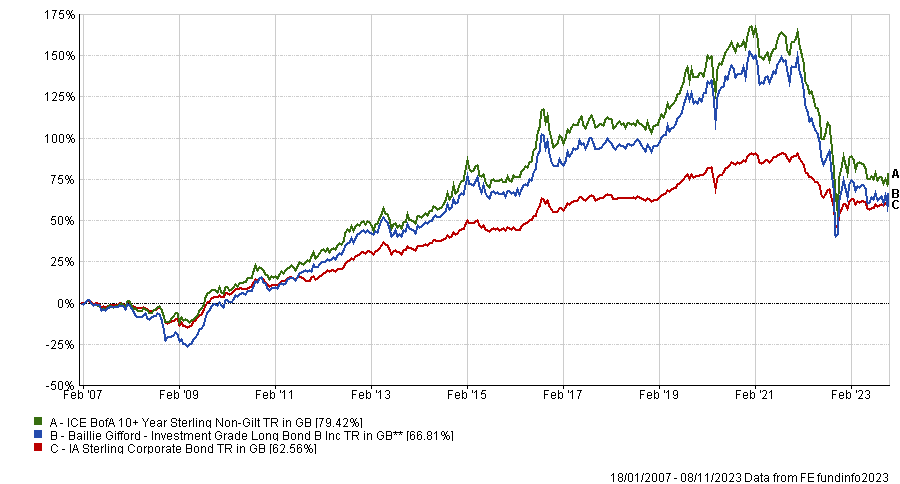Baillie Gifford is to close its sub-scale Investment Grade Long Bond fund after years of poor performance and withdrawals by investors. Trading will be suspended on 29 November with final closure on 6 December.
The fund’s performance has ranked in the bottom quartile of the IA Sterling Corporate Bond sector over three, five and 10 years – netting investors a double-digit loss over the medium term.
However, since its launch in 2003 the portfolio has beaten its average peer, making 66.8% over 20 years, as the below chart shows.
Performance of fund vs sector and benchmark since launch

Source: FE Analytics
However, assets under management have been on a steady decline in recent years as performance has waned. In 2020 it had £248.5m worth of investors’ cash, but this has sunk to just £24.8m today.
The size of the fund has halved since March 2023, when Baillie Gifford’s value assessment report said the portfolio “provided value”, despite scoring poorly on performance.
Managed by Paul Dilworth since 2019, under his tenure the portfolio has made a loss of 25.7%, the fifth-worst in the sector but in-line with the 25% loss from the ICE BofA 10+ Year Sterling Non-Gilt benchmark.
Dilworth continues to manage the £890m Baillie Gifford Investment Grade Bond fund and co-heads Baillie Gifford Sterling Aggregate Bond alongside Philip Annen and Stuart Kelly.
Both funds have also struggled to perform, however, and sit in the bottom quartile of the IA Sterling Corporate Bond and IA Sterling Strategic Bond sectors respectively over three and five years.
The Edinburgh-based asset management firm is synonymous with the growth equity investing, however its bond division is also large, with £2.3bn in assets under management split among its fixed income funds in the Investment Association universe.
The latest move continues the firm’s look at its fixed income funds, after it closed two of its UK government bond funds in 2020 following its value assessment that year.
A spokesperson for Baillie Gifford said: "The fund has primarily been used by defined benefit pension schemes to access long-dated assets. As these schemes have matured, they have sold out of the fund, leading to a decrease in its assets under management (AUM). In light of the fact the managers see limited potential for meaningful future inflows, Baillie Gifford has decided it is in the best interests of the shareholders to close the fund."





